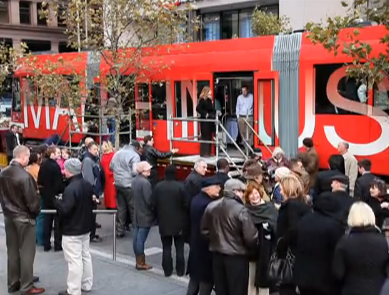In an unprecedented action, Ohio Senate Transportation Committee Chair Tom Patton allowed a provision to be introduced to the latest amendment of the state’s biennial transportation budget that would “prohibit state or federal funds appropriated by the state from being used for the Cincinnati streetcar project.”
The action comes on the heels of recent news that newly elected Governor John Kasich (R) plans to strip the project of approximately $52 million in state appropriated funds. Such an action would go directly against the state’s laws and proceedings for appropriating state and federal transportation dollars, and could be subject to legal action from the City of Cincinnati.
“So if you suddenly don’t like the process established by law that has worked well for 14 years under Democrats and Republicans, you change the process,” said Ken Prendergast, executive director of All Aboard Ohio. “This is like saying we didn’t like who won the Super Bowl, so we’re going to re-write the record books.”
Provision SC-0257-1 was approved out of committee Tuesday evening as part of an omnibus amendment, and will then go to the full Senate and House. The omnibus amendment, according to Prendergast, could then either be accepted as is, or be assigned to a conference committee if the House finds the bill substantially different from the version it passed last week that did not include the anti-streetcar provision.
The unprecedented attack against the Cincinnati Streetcar, the Ohio Department of Transportation’s (ODOT) highest-ranking transportation project pending anywhere in the state, further exemplifies the cavalier attitude of the newly elected governor and Ohio General Assembly.
Prendergast notes that the Cincinnati Streetcar was ranked as the state’s top transportation project based on economic development, cost-effectiveness and environmental impact criteria by the Transportation Review Advisory Council (TRAC), a non-political review board established by state law in 1997. The TRAC, he says, was created, urged in part by then and current ODOT Director Jerry Wray, to remove politics from the state’s transportation project selection process.
Previous actions by the TRAC include unanimous votes in support of the funding appropriations for the $128 million Cincinnati Streetcar project.
“These are not state funds, but state-administered transportation funds. If they don’t go to the streetcar, they will go to a lower-ranking road project,” Prendergast emphasized. “If state officials really want to save taxpayers’ money, they should cut from the bottom-ranked projects, not from the top.”
Prendergast went on to say that in his nearly 30 years of transportation advocacy that he has never seen such a blatant attempt to discriminate against rail projects in such a manner. And he points to a November 2009 vote in Cincinnati that defeated a measure that would have singled out rail projects for public votes by 55 to 45 percent.
“As young Ohioans flee to vibrant cities that offer transportation choices, as Baby Boomers face a future of house arrest without options to cars, and as all Ohioans face immobility from worsening global petroleum constraints, this amendment by the Ohio General Assembly to punish a very specific transportation project is worse than counter-intuitive. It’s downright mean.”

